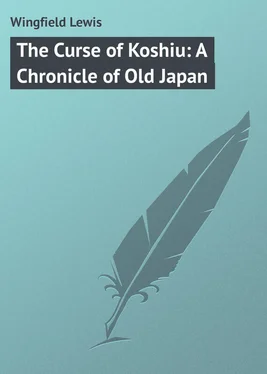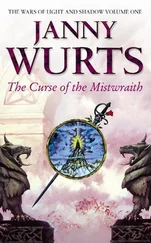Lewis Wingfield - The Curse of Koshiu - A Chronicle of Old Japan
Здесь есть возможность читать онлайн «Lewis Wingfield - The Curse of Koshiu - A Chronicle of Old Japan» — ознакомительный отрывок электронной книги совершенно бесплатно, а после прочтения отрывка купить полную версию. В некоторых случаях можно слушать аудио, скачать через торрент в формате fb2 и присутствует краткое содержание. Жанр: foreign_prose, на английском языке. Описание произведения, (предисловие) а так же отзывы посетителей доступны на портале библиотеки ЛибКат.
- Название:The Curse of Koshiu: A Chronicle of Old Japan
- Автор:
- Жанр:
- Год:неизвестен
- ISBN:нет данных
- Рейтинг книги:3 / 5. Голосов: 1
-
Избранное:Добавить в избранное
- Отзывы:
-
Ваша оценка:
- 60
- 1
- 2
- 3
- 4
- 5
The Curse of Koshiu: A Chronicle of Old Japan: краткое содержание, описание и аннотация
Предлагаем к чтению аннотацию, описание, краткое содержание или предисловие (зависит от того, что написал сам автор книги «The Curse of Koshiu: A Chronicle of Old Japan»). Если вы не нашли необходимую информацию о книге — напишите в комментариях, мы постараемся отыскать её.
The Curse of Koshiu: A Chronicle of Old Japan — читать онлайн ознакомительный отрывок
Ниже представлен текст книги, разбитый по страницам. Система сохранения места последней прочитанной страницы, позволяет с удобством читать онлайн бесплатно книгу «The Curse of Koshiu: A Chronicle of Old Japan», без необходимости каждый раз заново искать на чём Вы остановились. Поставьте закладку, и сможете в любой момент перейти на страницу, на которой закончили чтение.
Интервал:
Закладка:
I am afraid I must admit at once that Sampei, to whom I am very partial, was a sad flirt. He invented appalling tales of death and slaughter, for the pleasure of seeing the cheek of O'Tei grow whiter, then set himself to woo the delicate sea-shell colour back with well-timed jest; and was flattered and pleased to find that he could learn to play upon her as on some fragile instrument. To the girl his radiant advent was a strange and wondrous break in the sweet monotony of years, – a revelation like the raising of some veil that masks the infinite; and she marvelled vaguely whether the perfumed wood would hold so rich a charm when he was no longer there to rouse the echoes with his laughter. Hand in hand they wandered-artless children-while the soft-eyed deer peeped out at them approvingly. They visited her favourite haunts; the open glade where the glorious lilies grew in clusters-lemon-yellow, or white, brown centred; where the great jewelled butterflies tumbled low along like junks under heavy sail; where beds of scarlet blossoms like geraniums nestled in sheets on the bank of a crystal stream-home of flights of glittering dragon-flies, black and iron-blue, like the cohorts of the warlike Osaka. And then the sharp twee twee of the cicadas, answering or calling one another out of the deep stillness of the canopy above, the boom of the hoarse bees, the buzzing of gossamer wings, the click of the cricket, the hum of the myriad tiny voices up in the dense green, which joining in harmonious chorus form a silence-a haven of solitude and rest.
It was not possible to linger in the shadowed aisles whose pillars were the giant cryptomerias, without feeling subdued and softened; and a suspicion flitted more than once across the mind of the young soldier that perchance the career of hurly-burly and the clash of steel were a mistake, the contemplative life a better. What happier method of getting through the cycle than to muse away the years, till called to go, with gentle O'Tei, and the forest, and the animals? And then, the sylvan influence and flash of the clear eyes removed, Sampei would wake and shake himself in distress, and know that the ground was dangerous. The contemplative life was good for girls and shaven priests, and men who had succumbed in the battle. Youths with lives spread out before like a trail of moonlight on the sea, must gird up their loins and elbow their way through the medley. Too long already had the young General dallied, wasting time. And yet, not wasting, for he and she were to be friends for life-that was quite settled-dear brother and loving sister, trusting each other without question, certain, in moments of emergency, of the completest helpfulness and sympathy. It was delicious to possess such a sister, a soft warm sunspot on his harsh career; more she might never be, and he recognised that this was well.
Her gentleness unnerved his arm, he was wont jestingly to say, for her nature was woven of such frail glass threads that just as the rush of the herd snapped the slender lily-stems, a rude puff of wind might shatter it. Some day she would find a suitable husband, and her adopted brother would love him for her sake; and then they would recline in the long grass and fall a-talking of what the lucky mortal would be like. To match with the perfection of O'Tei he must be a perfect creature. Not a bluff soldier like Sampei. No, that would never do, for like a tender plant must the dear maid be cherished. To the end must the White Fawn be screened from din of war and rude surroundings. Poor hearts! They were both so young and ignorant and hopeful. They knew not how futile a pastime is the building of air-palaces. They were unaware that Fate is a sad marplot, and that if we plan a matter in a certain way, it will surely come out quite otherwise.
The Shinto virgins were somewhat scandalised by the romantic proceedings of the fair O'Tei and the too good-looking General. They were disinclined to approve of him, for they knew he had said that, with faces painted a dead white, eyebrows at top of foreheads, and long flat hair well-oiled, they looked like the dolls of Asakusa. A ribald military person was not expected to have taste, or to know wherein lies true beauty, but he might show more respect for youthful gorgons. O'Tei did little credit, they averred, with tart displeasure, to her education. If she pined for male society, was not the temple full of holy bonzes? The heiress of Nara showed lamentable signs of incipient depravity. What business had she with Sanjo, the common armourer? She who, wayward always and inconsistent, when taught like every prospective chatelaine to wield a pike, had been wont to toss down the silver-mounted weapon, with a pout, vowing that she hated fighting.
Things could not go on as they were, for the situation was a false one. Sanjo grew nervous. If the Daimio of Nara, who as Kugé or court noble lived usually at Kiŷoto in attendance on the Emperor, were to hear that his only child, instead of innocently floating through mazes of kagura , was using his (Sanjo's) forge for flirting purposes with an ineligible man who was the son of a concubine, there would be trouble; and Sanjo was not unaware of the parable concerning iron pots and earthen pipkins. All were relieved, therefore, except O'Tei, who was hazy as to her own sentiments, when the news arrived that the rebellion in Corea was to be quelled, and that Sampei was to command the expedition.
When brother and sister parted, O'Tei clung round the neck of the youth, and, weeping bitterly, shivered she knew not why. Lovingly he kissed her brow, and disengaged himself from her embrace, and was more than ever certain as he rode away that, perfect in a congenial sphere, as wife of some grandee who would appreciate her gentle excellence, his sweet and sensitive sister would make the worst of consoles for one whose trade was war.
CHAPTER II.
THE LAST HOJO
Being a cunning and artful reader, you have long since guessed that the pattern maid whose benign influence was destined to reform the brutish No-Kami, was no other than O'Tei, while the paragon Daimio was Nara.
The Shinto virgins, as unjust and purblind as young gorgons may be expected to prove, were quite wrong as to O'Tei, who was no flirt. She did all credit to her rearing, for, when summoned to leave the conventual seclusion of the forest and assume the garb and responsibilities of her rank, she dutifully murmured, "Let my father's will be done," and accepted the husband of his choice. She had never been told-for the holy bonzes knew little about the subject-that in many marriages there are but two cheerful days-the first and the last-and marched straight upon her fate without a tremor.
The elder Hojo, though a crafty and long-headed statesman, made a sad mistake while arranging the affairs of his son. The air palace he built was complete and imposing, beautiful to the eye, but, as the muscular and practical Tomoyé had foreseen, its foundations were of the weakest. He forgot that old Nara, as lord in waiting, was likely to be deeply attached to the person as well as to the position of the Mikado; that he, like the rest of the Kugés, would probably treasure up the insults which were freely showered on his master, with a view to future vengeance.
Thanks to the uncompromising tactics of the despot, the reigning Mikado (there were three in exile) was a boy, a roi fainéant , a puppet; but he was hedged about with the intangible and mystic attributes of the Mikadoate, and the buffets he received reverberated along the line of Kugés into the hearts of the lower class. To possess the person of the Emperor was doubtless pleasing to the possessor-a trump card-but those who did not possess him felt his thraldom bitterly. That his daughter should wed the heir of the all-powerful Hojo was satisfactory and flattering to Nara. So long as the tyrant lived against whom it was hopeless to struggle, he would mask his game; but after his death, what then? He was expected to assume the functions of chief adviser, and keep the successor straight-was, in fact, to tighten the bonds about his master's limbs, for the behoof of the execrated family.
Читать дальшеИнтервал:
Закладка:
Похожие книги на «The Curse of Koshiu: A Chronicle of Old Japan»
Представляем Вашему вниманию похожие книги на «The Curse of Koshiu: A Chronicle of Old Japan» списком для выбора. Мы отобрали схожую по названию и смыслу литературу в надежде предоставить читателям больше вариантов отыскать новые, интересные, ещё непрочитанные произведения.
Обсуждение, отзывы о книге «The Curse of Koshiu: A Chronicle of Old Japan» и просто собственные мнения читателей. Оставьте ваши комментарии, напишите, что Вы думаете о произведении, его смысле или главных героях. Укажите что конкретно понравилось, а что нет, и почему Вы так считаете.












